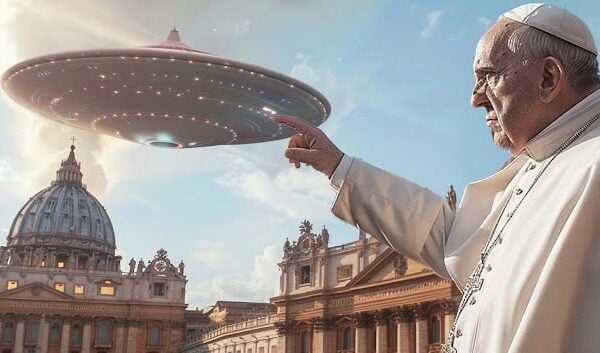
Do aliens exist? Angels or aliens? Some Researchers Say Vatican Archives Hold UFO Secrets!
Do Aliens Exist? A Catholic Perspective with Fr. Mike Schmitz The recent government report on unidentified aerial phenomena (UAP), which hinted at the recovery of “non-human” biotics from crash sites, has sparked widespread public interest. While some wonder about the nature of these entities, Catholics are asking deeper questions: Could these beings be part of God’s creation? Fr. Mike Schmitz, known for his popular Bible in a Year and Catechism in a Year podcasts, tackled this very topic in a recent video. Sporting a summer tan and his signature humor, Fr. Schmitz shared his thoughts on whether aliens could exist and what their existence might mean for Catholic faith and doctrine. He began with a lighthearted admission:“The reason I’m doing this video is because I’ve gotten so many people asking me, ‘Father, what do you think about aliens? Could they exist?’ Here’s the answer—it might be the shortest video ever—they could,” he said with a laugh. Fr. Schmitz explained that, although no concrete evidence of extraterrestrial life exists, it’s not impossible. Given the vastness of the universe, with countless stars and even more planets, the idea of life beyond Earth remains plausible. Would Aliens Challenge Catholic Faith? When asked whether the discovery of alien life would alter Catholic beliefs, Fr. Schmitz offered a resounding no. He emphasized the complementary nature of faith and science, explaining that both seek truth—albeit in different realms. “The goal of science is the pursuit of natural truth—understanding the natural world,” he explained. “Faith, on the other hand, seeks truth in the supernatural world. Truth cannot contradict truth, so good science and good faith will never be in conflict.” Science asks how things came to be, while faith explores who created them and why. If extraterrestrial life were discovered, Catholics would see it as part of God’s creation, much like humanity, the Earth, and the heavens. Made in God’s Image Fr. Schmitz highlighted that if intelligent alien life exists, it too could be made in God’s image. This, he clarified, does not mean aliens would look human, but that they might share attributes like intellect, will, the capacity to love, and freedom—qualities that reflect God’s essence. He drew a parallel with angels, beings Catholics already believe to exist but which are vastly different from humans. “God’s creativity is infinite,” Fr. Schmitz remarked. “Just as he made angels and humans, he could create something else entirely.” While the Catholic Church has no definitive teaching on extraterrestrial life, Fr. Schmitz affirmed that if aliens exist, their origin would undoubtedly be God. Faith in the Face of Discovery Ultimately, Fr. Schmitz’s message is one of trust in God’s providence and openness to discovery. Whether or not alien life is found, Catholics can rest assured that their faith is unshaken. Creation, in all its mystery and vastness, only points more profoundly to the glory of God. As Fr. Schmitz reminds us, “If aliens exist, then God is the source.” Are the Vatican Archives a Key to Understanding UFOs and the Paranormal? In recent years, the Vatican Apostolic Archives have drawn interest from scientists and researchers seeking insights into unidentified aerial phenomena (UAP) and paranormal activity. Spanning over 50 miles of shelving, the archives hold centuries of documents, from papal letters to reports of miraculous occurrences. Some believe these records could offer valuable clues about unexplained phenomena. This curiosity gained traction in 2023, following testimony from former U.S. intelligence official David Grusch, who alleged Vatican involvement in covering up UFO-related events. Grusch claimed that Pope Pius XII had shared information with the U.S. about a crashed UFO recovered in fascist Italy. The Vatican, however, has dismissed such claims. Marco Grilli, secretary to the prefect of the archives, likened these inquiries to requests for mythical documents like letters from Pontius Pilate or the Virgin Mary. Despite these denials, scholars like Diana Walsh Pasulka argue that the archives hold untapped accounts of paranormal events. In her book American Cosmic, Pasulka highlights historical reports, such as nuns witnessing mysterious orbs, that she believes could be linked to UFO phenomena. Stanford professor Garry Nolan also sees the archives as a potential treasure trove for understanding unexplained phenomena, calling them “the oldest library system of paranormal or supernatural knowledge still extant.” For Nolan, studying UFOs could offer hope, suggesting that advanced civilizations have survived existential threats like climate change and war. His Sol Foundation, launched in 2023, aims to foster dialogue with religious institutions like the Vatican on the implications of discovering extraterrestrial life. This intersection of science, religion, and the paranormal has intrigued figures like Father Francis Tiso, who sees potential in studying Catholic miracles as part of broader paranormal phenomena. Similarly, scholars like Jeffrey Kripal and Carlos Eire have noted parallels between religious experiences and UFO encounters, such as levitation, telepathy, and other extraordinary events. While the Vatican maintains that its archives contain no records of extraterrestrial life, researchers remain fascinated by the possibility of uncovering connections between faith, history, and the unexplained. For now, the archives continue to captivate imaginations, serving as a bridge between the mysteries of the past and humanity’s quest for answers.